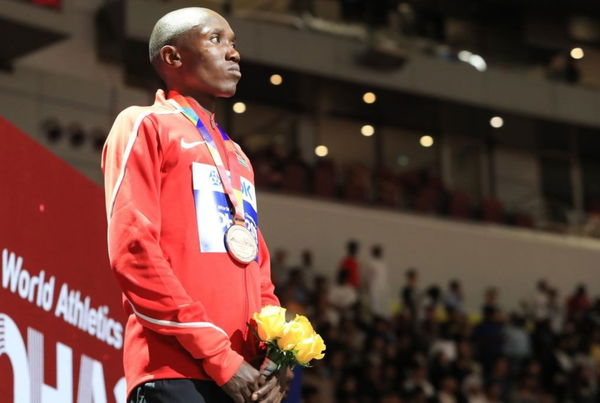

Ahead of the Paris Olympics, fresh new drama brews in the world of track and field. Kenyan sensation Rhonex Kipruto finds himself at the center of a doping controversy that’s sending shockwaves through the sport. The Athletics Integrity Unit (AIU) dropped the bombshell: Kipruto has been slapped with a six-year ban, effectively sidelining him until May 2029.
The AIU’s expert panel didn’t mince words, concluding that Kipruto was embroiled in a sophisticated doping scheme aimed at artificially enhancing his performance over a prolonged period. It’s a stark reminder that the battle against doping in sports is far from over. But the fallout doesn’t stop there.
Kipruto’s entire track record from September 2018 to May 2023 is now under scrutiny. This means waving goodbye to some of his most celebrated achievements, including his jaw-dropping world record in the 10K road race set in January 2020. The ripple effects extend to other athletes as well.
ADVERTISEMENT
Article continues below this ad
Wow. Rhonex Kipruto has been banned until May 2029.
The AIU’s expert panel determined he “was involved in a deliberate and sophisticated doping regime over a long period of time in order to artificially enhance his performance through doping.”
All results from Sept. 2018 to May… https://t.co/ELbBOfQy19
— Chris Chavez (@ChrisChavez) June 5, 2024
With Kipruto’s disqualification, the podium standings from events like the 2019 World Championships in Doha are being reshuffled. It’s a complex puzzle, with athletes like Ethiopia’s Andamlak Belihu potentially stepping into the spotlight to claim rightfully earned medals. But it’s not just about accolades; there are financial repercussions too.
Prize money earned from victories like the Stockholm Diamond League win in 2019 and the NYC Half Marathon triumph in 2022 is now up in the air, leaving athletes who competed against Kipruto wondering what comes next. As we take a moment to contemplate the ramifications of Rhonex Kipruto’s ban, it’s essential to understand the journey that led to this significant setback.
How did this massive setback ahead of the Paris Olympics begin for Rhonex Kipruto?
Suspended in May 2023 over suspicions of doping, Rhonex Kipruto’s case underwent meticulous scrutiny over a long time. The most recent update in 2024 revealed a decisive ruling by a disciplinary tribunal. They found irregularities in Kipruto’s Athlete Biological Passport (ABP), a document that reveals telltale signs of doping.
The AIU concluded that the abnormalities in the ABP were likely due to blood manipulation, potentially involving the use of recombinant human erythropoietin (rEPO), a banned substance known to boost endurance by increasing red blood cell production. However, it’s important to note that the irregularities in his biological passport date back to late 2018, before he won a bronze at the World Championships and set the 10K road record.
ADVERTISEMENT
Article continues below this ad

ADVERTISEMENT
Article continues below this ad
Despite the damning findings, Kipruto maintained his innocence. Shortly after his suspension in 2023, he defiantly declared on social media, “I don’t cheat or dope!” and he also shared, “The truth is on my side. This is all I can say.” A lengthy 4,000-word press release linked to Kipruto’s social media showed that Kipruto underwent more than 50 drug tests from July 2018 to March 2022, none of which returned positive results for banned substances.
In the wake of the AIU’s latest ban, the 24-year-old Kipruto still has the option to appeal the decision to the Court of Arbitration for Sport. Nevertheless, the reality remains that he is barred from competing in any races until 2029. This development marks a profound setback in the career of the Kenyan track star, leaving his future in the sport uncertain. What are your thoughts on this ban? Share in the comments below!
ADVERTISEMENT
ADVERTISEMENT
ADVERTISEMENT
